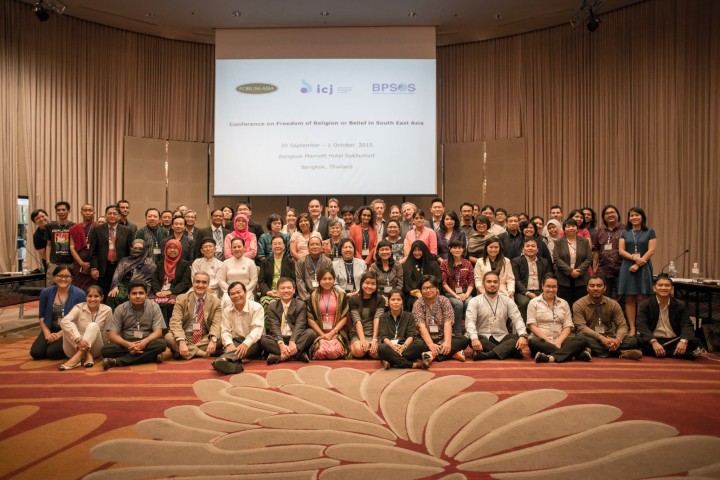In 2016 the Asian Forum for Human Rights and Development (FORUM-ASIA) celebrates its 25 year anniversary. 25 years of promoting and protecting human rights. This is both a reason for celebration and reflection. To reflect on what we have done, what lessons we have learnt, and what we see as priorities for the future.
To commemorate this milestone FORUM-ASIA launched an anniversary campaign during an event on 8 January 2016 at the Pridi Banomyong Institute in Bangkok, Thailand. As part of the campaign a new publication was composed, ‘Our Struggle for Human Rights – 25 Years of FORUM-ASIA’. An online version of this publication can be found on http://25.forum-asia.org.
Part of the publication has been a reflection on the future of human rights in Asia. This resulted in nine trends that are a cause for concern for human rights in the region, and as such should be the focus of our efforts in the coming decades.
Potentially the most devastating trend that was identified is the perceived increase in enforced disappearances and extra-judicial killings, which is being hidden by a culture of impunity and fear. Human rights defenders (HRDs) and reporters have long been the targets of these horrific ordeals. A new group, though, that is increasingly being victimized are bloggers.
Directly related, and by far the most mentioned, is that throughout Asia there seems to be shrinking space for civil society. Obviously, the more authoritarian the regime, the worst this trend is. However, unfortunately it was also noted that several countries, that claim to be democracies, are increasingly cracking down on civil society.
One of the discourses that is increasingly being heard to justify this crack down on civil society, and other forms of human rights violations, relates to national security. The doctrine of fear that has inspired anti-terrorist laws across Asia is used to violate human rights on a daily basis. Under the guise of protecting the safety and security of the nation, the rights and freedoms of people are sacrificed.
Several contributors also reflected on the many flawed democracies across the region. Good governance and transparent institutions are still a distant dream in many countries. Restricting the right to information and press freedom were indicated as closely linked to limitations of Asian democracies.
Many people in Asia face the violations of their human rights on a daily basis. There are certain groups in society though that face additional challenges only because of who they are. Some of the groups that are particularly marginalised are: women; indigenous people; the lesbian, gay, bisexual, transgender, intersex, and questioning (LGBTIQ) community; migrants and refugees; and religious minorities.
Radicalisation and polarisation, both within and between countries, were seen by many as another worrisome trend in Asia. While in many instances this is linked to religion, other forms of fundamentalism – based on ideologies or national identities – are on the rise too.
Economic growth has been unequal among the different countries in the region. Globalisation and free-trade have created a competitive market in which many Asian economies largely rely on cheap labour. Human rights related challenges that HRDs in Asia have long campaigned against remain. This includes corruption, land-grabbing and the intrusive projects of extractive industries. However, the human rights movement has become more aware of the need to expand its work to address the role of businesses and corporations. Particularly globalisation and multi-country trade agreements are cause for concern.
Environmental and climate justice are of increasing importance for people in Asia. The struggle for resources, in particular land and water, is becoming more intense. This is further exacerbated by the degradation of the environment and the consequences of climate change. Asia houses some of the countries most vulnerable to global warming and climate change. Floods, desertification, mudslides and rising sea-levels are threatening the areas and communities that people live in.
Finally, the world is currently facing an unprecedented flow of displaced people. Asia is no exception. On the contrary, some say that the numbers of refugees and migrants, as well as their treatment is among the worst in the world. There is a serious leadership crisis with regard to migration in the region. More so, most countries lack national legislation to protect refugees, while regional frameworks are weak or non-existent.
In addition to the areas of concern, the reflections also identified different suggestions on how to move forward. On how to promote and protect human rights in Asia in the coming decades.
Potentially the most important thing to improve the human rights situation in Asia is for people to know their rights. Knowledge and collaboration will be key for change to come. The need to regain regional solidarity and potentially even the need to (re)create and promote a sense of Asian identity, was mentioned by many. Collaboration between civil society and the media – two camps that do not always trust each other – is highly important to improve human rights in Asia.
Clearly the array of issues and challenges that have been prioritised for the future of human rights in Asia are many. This list is not exhaustive. Many more issues could and should be added.
What is important is that all the people that contributed to the reflections, were willing to do so, and believed in the need to do so. Even though they identified many challenges, they have not given up. They still believe there is a future for human rights in Asia. Our struggle continues.
***
FORUM-ASIA is a network of human rights organisations from all over Asia. FORUM-ASIA’s mission is to strengthen the human rights movement in Asia through advocacy, capacity building and solidarity action. It was established in 1991, and currently has members in around 20 countries across the region.






